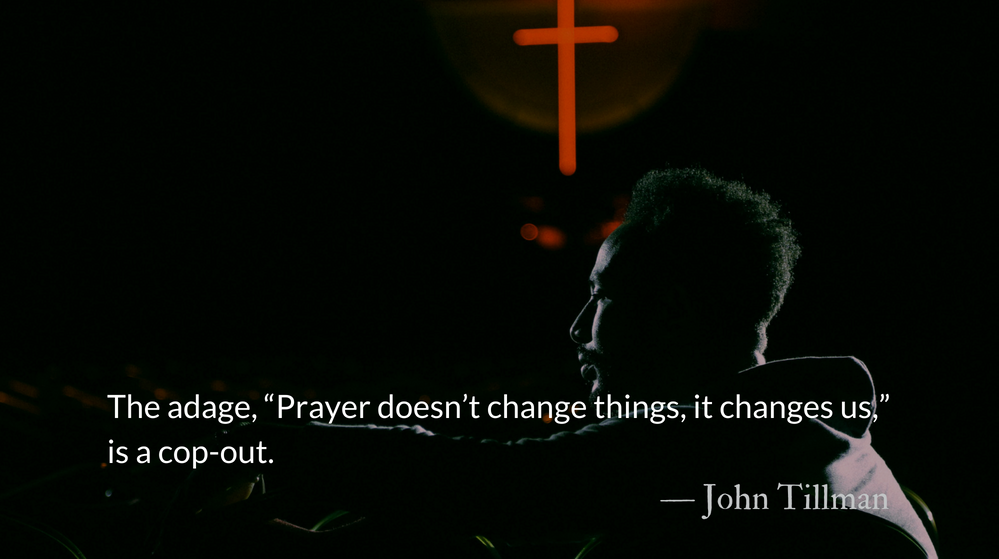Scripture Focus: Isaiah 38.15-19
15 But what can I say?
He has spoken to me, and he himself has done this.
I will walk humbly all my years
because of this anguish of my soul.
16 Lord, by such things people live;
and my spirit finds life in them too.
You restored me to health
and let me live.
17 Surely it was for my benefit
that I suffered such anguish.
In your love you kept me
from the pit of destruction;
you have put all my sins
behind your back.
18 For the grave cannot praise you,
death cannot sing your praise;
those who go down to the pit
cannot hope for your faithfulness.
19 The living, the living—they praise you,
as I am doing today;
parents tell their children
about your faithfulness.
Reflection: The Impression That We Give
By John Tillman
Have you ever been close to tragedy or been close to folks who have?
If you are humming a tune right now, you probably recognize the question above as the opening line of a popular song from 1997. “The Impression That I Get” doesn’t give the first impression of a song with deep meaning. The Mighty Mighty Bosstones bouncy, ska-infused beat sounds like a perfect summer party jam for the beach or pool, with a chorus people love to scream-sing along with. But the lyrics are deeper than a party pool or the shallow swim area at the beach. The song discusses seeing someone’s tragedy up close and doubting if you would have the faith, the strength, or the courage to face it.
“I’m not a coward, I’ve just never been tested
I’d like to think that if I was I would pass
Look at the tested and think “There but for the grace go I”
Might be a coward, I’m afraid of what I might find out”
We find out a lot about Hezekiah’s faith when he faces a deadly illness. Hezekiah described a painful time of emotional anguish as being crushed by the jaws of a devouring lion. Yet in prayer, weeping, and lament, Hezekiah reached out to God and was miraculously healed.
In Victor Frankl’s Man’s Search for Meaning, he found that the survivors of Nazi death camps had in common a transcendent source of meaning outside of career, family, or possessions. The greatest sources of inner hope and meaning are not self-created but discovered in God.
With purpose, we suffer on. With hope for something better, even if we’ll never experience it, we endure the present. Meaning and hope discovered in God create and sustain courage and cannot be taken away in suffering, even if everything, including your life, is.
What we discover in God, we must help guide others to discover. Hezekiah’s psalm isn’t a party jam but it is a freedom song, a testament of faith and hope not fear and panic. The next generation has plenty of panic and fear. They need the hope and purpose we discover in the gospel. Pain is not purposeless and God’s grace is sufficient for us. (2 Corinthians 12.9)
What stories of suffering have you been telling and what songs of hope have you been singing?
What impression of God’s faithfulness do we give?
Divine Hours Prayer: The Morning Psalm
Therefore I will praise you upon the lyre for your faithfulness, O my God; I will sing to you with the harp, O Holy One of Israel.
My lips will sing with joy when I play to you, and so will my soul which you have redeemed.
My tongue will proclaim your righteousness all day long, for they are ashamed and disgraced who sought to do me harm. — Psalm 71.22-24
– From The Divine Hours: Prayers for Summertime by Phyllis Tickle.
Today’s Readings
Isaiah 38 (Listen 3:20)
Acts 25 (Listen 4:40)
Read more about From the Crucible of Suffering
Deep richness comes to people who face suffering biblically…joy and contentment difficult experiences cannot steal.
Read more about Worthy of Suffering
Every time the work was hindered, the apostles persevered. They had to…no, they got to continue preaching through many dangers.








